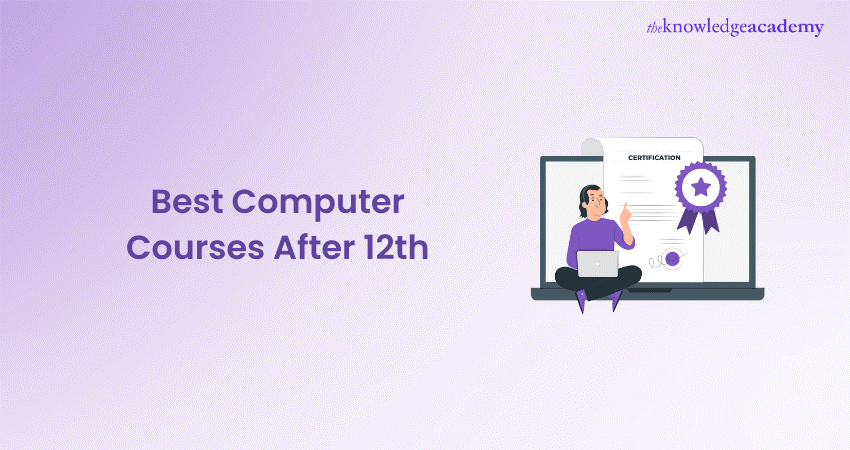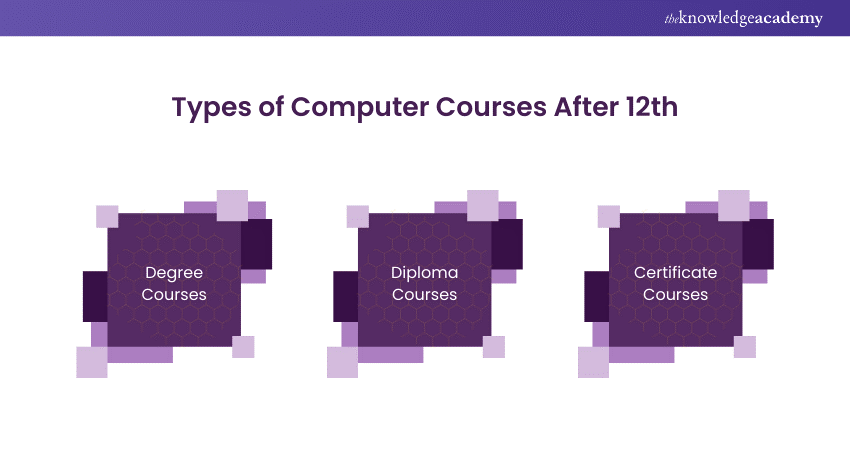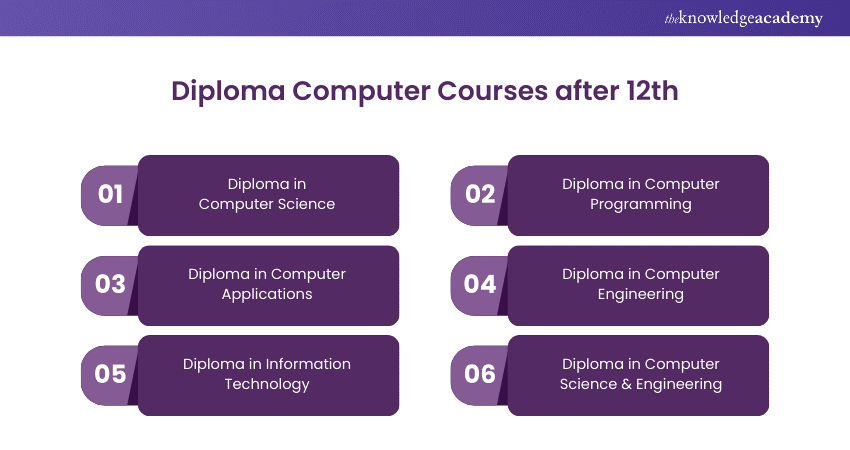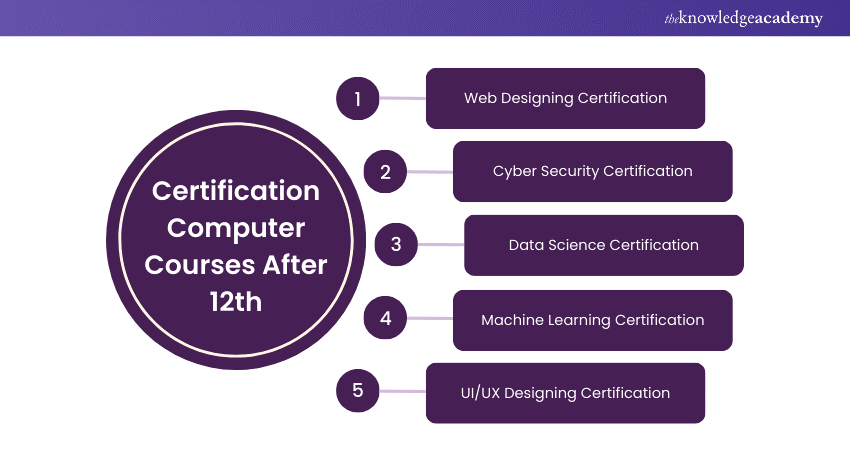We may not have the course you’re looking for. If you enquire or give us a call on +40 316317743 and speak to our training experts, we may still be able to help with your training requirements.
Training Outcomes Within Your Budget!
We ensure quality, budget-alignment, and timely delivery by our expert instructors.

After completing your 12th grade, the world of Computer Courses opens up like a treasure trove. Whether you’re drawn to Programming, Data Science, Cyber Security, or Web Development, there’s a course tailored just for you. Discover the Best Computer Courses After 12th that align with your interests.
From B.Tech and B.Sc degrees to diploma and certification courses, each option has its unique advantages and opportunities. By the end of this blog, you'll have a clear understanding of the Best Computer Courses After 12th to pursue, aligning with your interests and career goals. Let's dive in and uncover the perfect Computer Course for you after 12th grade.
Table of Contents
1) Types of Computer Courses After 12th
2) Degree Computer Courses After 12th
3) Diploma Computer Courses after 12th
4) Certification Computer Courses After 12th
5) Conclusion
Types of Computer Courses After 12th
Students can choose from a wide range of Computer Courses after completing the 12th grade, each with their own benefits and opportunities. Here is an overview of the three primary categories of Computer Courses that are offered:

1) Degree Courses
Computer Science and Information Technology degree programmes are comprehensive academic programmes that typically need three to four years of study to complete. The courses are meticulously designed to offer learners a comprehensive comprehension of fundamental Computer Science concepts, programming languages, and the latest technological advancements.
Students are provided with teaching and hands-on experience to develop skills in analysing, designing, and implementing software systems. The bachelor's degrees mentioned encompass several employment opportunities within the technology industry, namely focusing on data science, cyber security, and artificial intelligence. Graduates possess great value in the worldwide employment market due to their exceptional preparedness to tackle complex computer problems.
2) Diploma Courses
Typically spanning one to three years, diploma courses in Computer Sciences offer a more condensed and targeted approach than full degree courses. These courses are ideally suited for students eager to enter the job market swiftly, as they focus on practical, hands-on training in computing.
The course includes fundamental topics such as Software Development, Network Systems, Computer Programming, and Information Technology. Diploma projects equip students with applied skills, preparing them for specialised roles in technology such as Network Administration, Web Development, and technical support.
3) Certificate Courses
Certificate courses offer the fastest route to acquiring specialised knowledge in the computer field. These courses are succinct, generally lasting from a few months up to one year, and are intensely focused on particular skills or software tools currently in high demand within the technology sector.
Perfectly suited for both students aiming to bolster their expertise and professionals looking to update their skill set, certificate courses provide practical, skills-based learning that is immediately applicable in real-world job settings. Participants gain specialised knowledge in areas such as Programming, Software Development, and network security, essential for advancing in a technology-driven landscape.
Degree Computer Courses After 12th
Explore various degree courses in Computer Science and IT that pave the way for a successful career in technology.
1) B.Tech in Computer Science/IT course after 12th
The four-year Bachelor of Technology (B.Tech) Course provides thorough knowledge of Computer Systems, Networks, and Software Development. Covering topics like databases, cybersecurity, and programming languages, it prepares students for roles in IT management and Software Development.
Advanced subjects like Cloud Computing and Machine Learning are also included, ensuring students stay updated with industry trends. Through projects and internships, they develop analytical and problem-solving skills, ready for careers in technology or further study.
2) B.E In Computer Science course after 12th
The four-year Bachelor of Engineering (B.E.) courses cover Software Engineering, data structures, and algorithms, among other topics, by fusing theory with real-world applications. When subjects like artificial intelligence and cloud computing are included in the curriculum, students get practical exposure to cutting-edge technologies. This gets students ready for jobs in technology like project management, system analysis, and Software Development.
Furthermore, the course stresses critical thinking and problem-solving abilities, which are necessary to address actual problems in the always-changing technological industry. With a solid background in computer science, graduates are ready to continue their education or start lucrative professions in the IT sector.
3) BCA course after 12th
The Bachelor of Computer Applications (BCA) is a three-year degree programme designed to teach important skills in Software Development and IT. The course covers key areas like databases, networking, and programming languages such as C++ and Java.
Graduates gain the skills needed to succeed in the fast-changing tech industry. BCA prepares students for roles like project managers or software developers, allowing them to work on everything from developing applications to managing complex systems.
For those wanting to further their careers, additional education after BCA can lead to advanced opportunities. BCA provides both the basic skills needed to start in the tech world and the foundation for future professional growth.
4) B.Sc in Computer Science course after 12th
Three-year undergraduate study leading to a Bachelor of Science (B.Sc) in Computer Science provides comprehensive understanding of the theoretical foundations of the field. For those who want to grasp the fundamental ideas of system design and Software Development, this course is for them. It addresses a wide spectrum of topics including computational theory, system design, algorithms, data structures, and programming.
Students learn to solve issues effectively using a variety of programming languages and tools and to think algorithmically throughout the courses. Providing a comprehensive picture of the subject, the curriculum also explores advanced subjects including computer networks, database management, and artificial intelligence. The B.Sc. in Computer Science includes practical laboratories and projects that guarantee students can apply theoretical knowledge to practical settings.
Graduates of this degree are prepared for work in Software Engineering, data analysis, and systems architecture, among other fields in technology. A strong basis is also laid for additional study, including a Master's degree in Computer Science or a similar field. Academic research or specialist industrial jobs are made possible by this.
Enhance your engineering skills with our Engineering Skills Training and sign up today to advance your career!
Diploma Computer Courses after 12th
After completing 12th grade, students interested in pursuing a career in the field of computers have a wide array of diploma courses to choose from. Here are six examples of diploma courses that students can pursue after 12th:

1) Diploma in Computer Science
A comprehensive Diploma in Computer Science provides students with a foundational understanding and practical skills in programming languages, Software Development, and Computer Science concepts. The course covers topics such as database management, algorithms, computer architecture, and data structures. Graduates of this program can pursue roles in various industries as junior programmers, Software Testers, or IT support professionals.
2) Diploma in Computer Applications (DCA)
Students wishing to gain practical experience with office automation tools and computer software applications often choose this course. The course includes internet technology, web design, programming basics, and the MS Office Suite. Jobs as computer operators, office assistants, or data entry operators are available to DCA course graduates in government organisations, schools, and commercial businesses.
3) Diploma in Information Technology (DIT)
Practical features of network, system administration, and IT infrastructure are the main emphasis of the diploma in Information Technology. Pupils study operating systems, network protocols, computer hardware, and cyber security.
Additionally covered in the course is practical instruction in network device configuration and typical IT problem troubleshooting. DIT graduates can work for companies of all sizes as Network Administrators, system support technicians, or IT Consultants.
4) Diploma in Computer Programming
Students pursuing a diploma in Computer Programming will have a comprehensive understanding of programming languages and Software Development methodologies. Web Development technologies including HTML, CSS, and JavaScript as well as programming languages are covered in the course.
The Diploma in Computer Programming course also covers Software Testing, debugging, and Software Engineering concepts. This course graduates can find employment as junior Programmers, Web Developers, or Software Testers in IT startups or independent ventures.
5) Diploma in Computer Engineering
Computer architecture, digital electronics, and microprocessor systems are only a few of the hardware components of computing covered in a Diploma in Computer Engineering. Pupils pick up skills in computer system configuration, hardware problem diagnosis, and design and development. Additionally covered in the course are computer networks, robotics, and embedded systems. Graduates of this course can work in the IT and electronics sectors as technical support professionals, embedded systems developers, or hardware engineers.
6) Diploma in Computer Science & Engineering
The Diploma in Computer Science & Engineering provides students with a thorough understanding of both the software and hardware aspects of computers, integrating elements from both Computer Science and engineering. The curriculum encompasses a wide range of topics, including computer architecture, digital electronics, computer networks, data structures, and programming languages.
Students gain practical experience through projects, laboratory exercises, and industrial training. Graduates of this course are well-prepared for careers as IT Consultants, Network Administrators, System Analysts, or Software Engineers. They have opportunities across various industries, such as manufacturing, telecommunications, technology, and defence.
This diploma equips students with the essential skills and knowledge to thrive in the dynamic and evolving field of Computer Science and engineering, offering a solid foundation for a successful career in the tech industry.
Improve your productivity with Time Management Training sign up now!
Certification Computer Courses After 12th
After completing 12th grade, students can delve into a wide array of certification courses tailored to the ever-evolving landscape of technology. Here are ten certification courses available to students after 12th, each offering unique opportunities for specialisation and career growth:

a) Web Designing Certification: Completing this course teaches students how to create functional and visually appealing websites. By studying HTML, CSS, JavaScript, and design principles, they become ready for roles as front-end developers or web designers. This certification equips them with the tools needed to build engaging and user-friendly web experiences.
b) Cyber Security Certification: A Cyber Security Certification course teaches how to identify, prevent, and address cybersecurity threats. Students learn about network security, ethical hacking, and best practices, preparing them for careers as security professionals or cybersecurity analysts.
c) Programming Language Certification: These courses focus on languages like Python, Java, or C++. They prepare you for jobs as programmers or developers by covering Software Development techniques and programming foundations.
d) Graphic Designing Certification: Learn about graphic design principles, typography, colour theory, and layout composition. This certification prepares you for roles as graphic designers or visual artists.
e) Data Science Certification: Explore data analysis, Machine Learning, and data visualization. Graduates can work as data scientists, interpreting data for insights.
f) Tally Certification: Master accounting with Tally ERP software. Learn to handle accounts, stocks, and financial reporting for jobs in accounting and finance.
g) Data Analytics Certification: These courses cover statistical analysis, data mining, and predictive modelling. Graduates become data analysts or business intelligence analysts.
h) Machine Learning Certification: Dive into algorithms for data analysis and prediction. Ideal for those pursuing careers as Machine Learning engineers or AI researchers.
i) VFX & Animation Certification: Learn both 2D and 3D animation techniques, including motion graphics and special effects. Prepare for roles as animators or visual effects artists.
j) UI/UX Designing Certification: Develop user-centred interfaces and interactions. Gain skills in usability testing, interaction design, and prototype creation for UI/UX design and user experience research.
Join our Personal Development Courses today and enhance your skills and confidence!
Conclusion
Pursuing Computer Courses after the 12th grade opens doors to various career opportunities in technology. Whether through degree, diploma, or certification courses, students can gain essential skills and specialisation. The Best Computer Courses After 12th enable them to thrive in roles like Software Development, Cyber Security, and data analytics.
Advance your career with expert guidance; join our Career Development Course today and unlock new opportunities!
Frequently Asked Questions

Yes, you can pursue Computer Courses After 12th regardless of your stream. Whether you come from a science, commerce, or arts background, there are numerous Computer Courses available for you to explore. Many institutions allow you to embark on a successful career in the field of computers regardless of your stream.

Yes, certifications can significantly enhance your prospects in Computer Courses After 12th. They validate your skills and knowledge in specific areas of computing, making you more competitive in the job market. Employers often look for candidates with relevant certifications, as they demonstrate a commitment to continuous learning and professional development.

The Knowledge Academy takes global learning to new heights, offering over 30,000 online courses across 490+ locations in 220 countries. This expansive reach ensures accessibility and convenience for learners worldwide.
Alongside our diverse Online Course Catalogue, encompassing 17 major categories, we go the extra mile by providing a plethora of free educational Online Resources like News updates, Blogs, videos, webinars, and interview questions. Tailoring learning experiences further, professionals can maximise value with customisable Course Bundles of TKA.

The Knowledge Academy’s Knowledge Pass, a prepaid voucher, adds another layer of flexibility, allowing course bookings over a 12 month period. Join us on a journey where education knows no bounds.

The Knowledge Academy offers various Personal Development Courses, including Career Development Course, Engineering Skills Training, Time Management Training and Emotional Intelligence Training. These courses cater to different skill levels, providing comprehensive insights into World Art Day.
Our Business Skills Blogs cover a range of topics related to Personal Development, offering valuable resources, best practices, and industry insights. Whether you are a beginner or looking to advance your Business skills, The Knowledge Academy's diverse courses and informative blogs have you covered.







 Top Rated Course
Top Rated Course




 If you wish to make any changes to your course, please
If you wish to make any changes to your course, please


